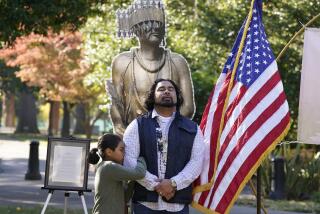Judge Upholds Closure of Tribe’s Smoke Shop
- Share via
PROVIDENCE, R.I. — Rhode Island authorities acted properly when they shut down the Narragansett Indian Tribe’s tax-free smoke shop, a federal judge ruled Monday.
U.S. District Judge William Smith said the state had the right to tax cigarettes sold at the shop on the tribe’s settlement land in Charlestown.
Seven members of the tribe, including the tribal leader, were arrested by state police in a tumultuous raid on the shop in July.
The tribe filed suit after the raid, arguing that, as a sovereign nation, it has a right to sell tobacco free of state taxes. The state argued that the tribe is bound by terms of a 1978 settlement agreement that gave the tribe 1,800 acres of land.
Smith ruled that the state’s tax falls on the tobacco consumer, not the tribe, making the tribe simply an agent for collecting the tax.
“It is appropriate for the state to impose this burden on the tribe; and such a burden does not amount to taxation of the tribe, nor does it violate the tribe’s sovereign rights,” Smith wrote.
The state charges a $1.71-per-pack excise tax on cigarettes, plus a 7% sales tax.
The tribe’s lawyer, Douglas Luckerman, said he was disappointed by the judge’s ruling on the tax issue, but he said the judge had rejected other claims made by the state seeking authority to enforce all state and civil and criminal laws on the tribe’s territory.
“The court’s now saying again that there are limits on the state’s exercise of its authority over the tribe and now the tribe’s land,” he said. “The state can’t go on their lands with impunity.”
Gov. Donald L. Carcieri said the ruling shows that state taxation laws apply to any tribal activity. “At last, now we have some guidance. We know the tax laws apply, the civil and criminal laws apply,” Carcieri said.
The dispute over the smoke shop is just one part of a long struggle between the state and the tribe, which has been seeking permission to open a casino for more than a decade.
The raid, which occurred in front of TV cameras, sparked sharp criticism, with many calling the state’s action excessive.
More to Read
Sign up for Essential California
The most important California stories and recommendations in your inbox every morning.
You may occasionally receive promotional content from the Los Angeles Times.













